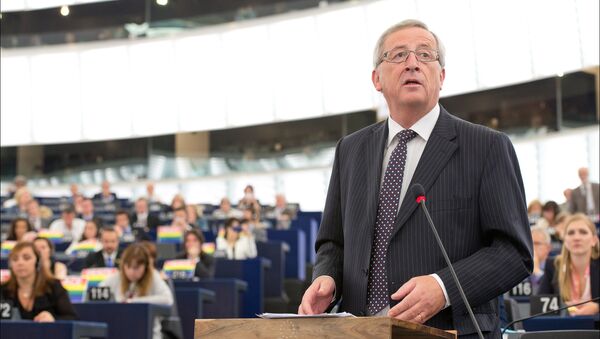The EC is set to make proposals of the Dublin regulation — by which migrants are processed in the first member state they enter — which has been widely flouted in the mass movement of people across Europe, which exploded in 2015 when German Chancellor Angela Merkel declared her country's doors open to Syrian refugees.
#TeamJunckerEU steps taken: #SmartBorders #Dublin Legal Migration & EU #asylum system | LIVE https://t.co/P0BIU0PzXA pic.twitter.com/VmunhNtRcG
— European Commission (@EU_Commission) April 6, 2016
The effect was to throw the Dublin regulation into disarray, with both Italy and Greece being unable to process the sheer volume of refugees arriving on their shores. Even now, Greece is struggling to staff the so-called 'hotspots' where migrants are being processed under the EU-Turkey agreement which returns "irregular migrants" from Greece to camps in Turkey.
Safe & legal pathways needed. Options to reform Common European #Asylum System: https://t.co/fEuihL3Rrv #MigrationEU pic.twitter.com/Xw5i5bHk58
— European Commission (@EU_Commission) April 6, 2016
In any case, many NGOs — including the Médecins Sans Frontières, the International Rescue Committee, the Norwegian Refugee Council, Save the Children and Red Cross — have joined the UN refugee agency UNHCR as saying the EU-Turkey deal is either immoral or illegal as the 'hotspots' have become detention centers. They also say Turkey is not a 'safe country' for migrants to be returned to, under the Geneva Convention.
What is the Dublin Regulation?
Fundamental to the EU immigration policy is the Dublin Regulation which stipulated that migrants must be processed — including fingerprinting — in the state of arrival. Their entitlement to asylum — if they are genuine refugees fleeing warzones or persecution on religious or political grounds, for instance — they have to be granted asylum in that state.
Presenting today reform options for #Dublin #MigrationEU https://t.co/JcN1ARvZQ5 pic.twitter.com/EmgvJjDI4I
— EUHomeAffairs (@EUHomeAffairs) April 6, 2016
Critics have long complained that the Dublin Regulation creates an unfair system that is expensive to operate and has been described by human rights groups as flawed.
"Asylum seekers wait in limbo, often separated from their families and in detention, pending transfer to the state deemed responsible for their claim. In some cases, their claims are never heard," the UN refugee agency UNHCR said.
The Dublin Regulation also lands refugees in a country no of their choice. A refugee trying to join relatives in Sweden — say — arriving in Greece will be given asylum in Greece. The refugee — critics say — would have more chance of finding work and integrating in the country where they have relatives or friends.
We want an ambitious and substantial improvement of #Dublin which leads to fairer outcomes for everyone.
— DimitrisAvramopoulos (@Avramopoulos) 6 April 2016
The Dublin Agreement also means that a huge burden falls on countries such as Greece and Italy which bore the burden of the initial flights of migrants across The Mediterranean and then Greece, in particular, following the opening-up of the West Balkan route.
Shaky Proposals
The European Commission is believed to be considering two options. The first would be to scrap the Dublin regulation and introduce the mandatory distribution of refugees around EU member states according to wealth and population. This is unlikely to happen in the light of severe opposition to the quota plan for refugees favored by Merkel and European Commission President Jean-Claude Juncker.
#smartborders: crossing an EU border will never be the same again.It will be automated and done mostly through self-service&electronic gates
— DimitrisAvramopoulos (@Avramopoulos) 6 April 2016
The second would be to retain the regulation, but — in times of crisis — introduce a "corrective fairness mechanism" to relocate migrants around the EU based on the plan to relocate 160,000 from Greece and Italy agreed in September 2015, which has seen barely 1,000 actually relocated amid similar opposition to mandatory quotas.


